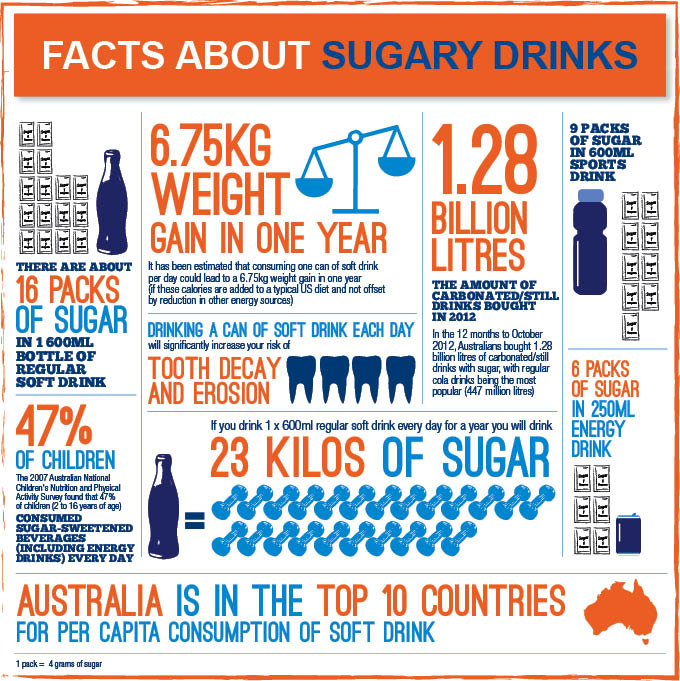Did you know?
- Sugary drinks, or sugar sweetened beverages, include all non-alcoholic water based beverages with added sugar such as non-diet soft drinks, energy drinks, fruit drinks, sports drinks and cordial.
- Sugar sweetened beverages are high in kilojoules, leading to weight gain and obesity.
- Obesity is a leading risk factor for type 2 diabetes, cardiovascular disease and some cancers (including endometrial, oesophageal, renal, gallbladder, bowel and postmenopausal breast cancers).
- Research has shown that consuming 340ml of sugary drink a day (which equates to less than one can) increases your risk of type 2 diabetes by 22% when compared to drinking one can a month or less.1
- American estimates show that consuming one can of soft drink per day could lead to a 6.75kg weight gain in one year (if these calories are added to a typical US diet and not offset by reduction in other energy sources)*.2
- Young Australians are very high consumers of sugar sweetened beverages, and sugar sweetened soft drinks in particular. The 2007 Australian National Children's Nutrition and Physical Activity Survey found that 47% of children (2 to 16 years of age) consumed sugar sweetened beverages (including energy drinks) every day.3,4
- In the 12 months to October 2012, Australians bought 1.28 billion litres of carbonated/still drinks with sugar, with regular cola drinks being the most popular (447 million litres).5
- Many drinks contain acid that harms your teeth, including regular and diet soft drinks, sports/energy drinks and fruit juices. Acid weakens tooth enamel which can lead to tooth decay. Tooth decay is the most prevalent disease in Australia.6
- Sugar sweetened beverages produce more acid when the sugar combines with bacteria in the mouth. Try drinking water instead – it has no acid, no sugar, no kiljoules and if you get it from the tap it's free.

Download the Facts About Sugary Drink pdf
* Based on sugar sweetened consumption being added to a typical diet without reducing intake from other sources or increasing physical activity
- The InterAct Consortium. Consumption of sweet beverages and type 2 diabetes incidence in European adults: results from EPIC-InterAct. Diabetologia PMID, 2013. http://stochasticscientist.blogspot.com.au/2013/04/bad-news-about-sugary-soft-drinks.html#sthash.GJNRNvPI.dpuf
- Apovian CM. Sugar-sweetened soft drinks, obesity, and type 2 diabetes. Journal of the American Medical Assocation 2004; 292(8): 978–9.
- Mortensen A. The role of beverages in the diet of Australian children. Analysis and summary report commissioned by the Australian Beverages Council. Australia, 2010: 1–15.
- Clifton PM, Chan L, Moss CL, Miller MD, Cobiac L. Beverage intake and obesity in Australian children. Nutr Metab (Lond) 2011; 8: 87.
- Retail World December 2012.
- Walsh LJ. Black Cola drinks, oral health and general health: an evidence-based approach. ADA News Bulletin, 2008.